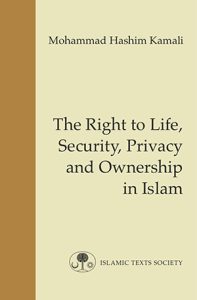The Right to Life, Security, Privacy and Ownership in Islam

Author: Mohammad Hashim Kamali
Publisher: Islamic Texts Society
Year of Publication: 2008
Print Length: 344 pages
Genre: Islamic Studies / Dawah & Applied Science, Islamic Law & Jurisprudence, Theology, Ethics and Philosophy, Qur’anic Studies
Topic: Security, Privacy, Ownership, Ethics, Culture & Society, Fundamental Rights and Liberties
Topic: Islam, Ethics & Morality, Fundamental Rights and Liberties, Human Nature & Character, Humanity, Identity, Ethics & Morality; Law, Jurisprudence, Legal Theory; Culture & Society, Ownership, Privacy, Security, Wellbeing
A person’s right to life, personal security, privacy, and ownership are the most basic of all the fundamental rights and liberties and are of concern to all legal systems and traditions. To address them side by side with one another, as is attempted in the present volume, is reflective of their natural priority and significance. These rights are simultaneously the most vulnerable to aggression and abuse.
The right to life is the basic right from which all the others derive. The discussion of this fundamental right includes: the sanctity of life from the Islamic perspective, murder, unintentional killing, the death penalty and compensations for victims. This chapter also includes discussions of abortion, suicide, and euthanasia.
The second of the rights discussed is the right to security and this includes: the security against unlawful arrest, the right to fair treatment, the right to counsel, freedom from aggression and torture.
The third right is that of privacy and is mainly concerned with the privacy of one’s home, confidential correspondence, and immunity against invasion of privacy in the forms of interception of correspondence, eavesdropping and other such violations.
Finally, the discussion of the right of ownership includes the four aspects of ownership in Islam, legitimate and illegitimate means of acquisition of ownership, and the restrictions that the Shari’ah imposes on the exercise of this right including taxation, inheritance and bequests.
Table of Contents
Note on the Series
Acknowledgments
Introduction
1. The Right to Life (Ḥaqq al-Ḥayāt)
1.1. Introductory Remarks
1.2. The Sanctity of Life
1.3. Just Retaliation and Blood Money (Qiṣāṣ & Diyyah)
1.4. Modern Law and Practice
1.5. The Killer Does Not Inherit
1.6. Could the Death Penalty be Based on Ta’zīr?
1.7. Suicide (al-Intiḥār)
1.8. Dueling and Permission to Kill
1.9. Abortion (Isqāṭ al-Janīn)
1.10. Euthanasia (Qatl al-Marḥama)
1.11. The Abandoned Child (al-Laqīṭ)
1.12. Warfare
1.13. Concessions Granted to Protect Life
Concluding Remarks
2. The Right to Personal Security (Ḥaqq al-Amn)
2.1. Introductory Remarks
2.2. Definition and Scope
2.3. Affirmative Evidence
2.4. The Principle of Legality
2.5. Accusation and Suspicion (al-Tuhma, al-Ẓann)
2.6. Arrest and Detention
2.7. The Issue of Beating the Accused
2.8. The Right to Counsel
2.9. Trial and Evidence
Concluding Remarks
3. The Right to Privacy (Ḥaqq al-Khuṣūṣiyyah)
3.1. Introductory Remarks
3.2. The Privacy of the Home (Ḥurmat al-Maskan)
3.3. Espionage (al-Tajassus)
3.4. Private Correspondence
3.5. Suspicion (al-Ẓann)
3.6. Preserving the Privacy of Others (Satr al-‘awrat)
3.7. Confidential Conversation (Kitmān al-Sirr)
3.8. Privacy of the deceased person
3.9. Restrictions on the Right of Privacy
3.10. An Overview of Modern Law
Concluding Remarks
4. The Right of Ownership (Ḥaqq al-Milkiyyah)
4.1. Introductory Remarks
4.2. Affirmative Evidence
4.3. The Vicegerency of Man
4.4. The Definition and Types of Ownership:
Complete and Deficient Ownership / Ownership of Rights / Private and Public Ownership
5. The Acquisition and Means of Ownership
5.1. Work (al-‘Amal)
5.2. The Reclamation of Barren Land (Iḥyā’ al-Mawāt)
5.3. Hunting
5.4. Mines and Treasure Troves
5.5. Land Grant (Iqtā’) by the Government
5.6. Inheritance
5.7. Zakāh and Charities
6. Restrictions on Ownership
6.1. The Prevention of Harm (Daf ‘al-Ḍarar)
6.2. Considerations of Public Interest (Maṣlaḥah) and Necessity (Ḍarūrah)
6.3. Land Utilization
6.4. Preemption (Shuf’ah)
6.5. Inheritance and Bequests
6.6. Taxation
Concluding Remarks
Bibliography
Index

Mohammad Hashim Kamali is an Afghan Muslim scholar who has taught and worked for many years in Malaysia. He is Founding Chairman and CEO of the International Institute of Advanced Islamic Studies, Malaysia (2007—continuing), and a world renowned scholar in his field of specialisation. He served as Professor of Islamic Law and Jurisprudence at the International Islamic University Malaysia (IIUM, 1985–2004); and was Dean of the International Institute of Islamic Thought and Civilisation (ISTAC, 2004–2006). Currently, he is Senior Fellow at the Institute of Strategic and International Studies (ISIS) Malaysia, a Senior Fellow of the Academy of Sciences of Afghanistan, and also Senior Fellow of the Royal Academy of Jordan.
Source: https://www.iclrs.org/blurb/mohammad-hashim-kamali/
More from Mohammad Hashim Kamali in this library, click here.
